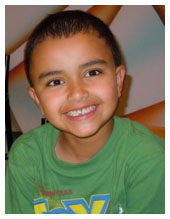The law’s on our side: happy anniversary, ADA
by Beth Finke
 My guess is that when President George H. W. Bush signed the Americans with Disabilities Act (ADA) into law 20 years ago, people with autism weren’t on his mind. But thanks to the way the law was written, and how it has been interpreted, people with autism are benefitting just like people who use wheelchairs or people like me, who are blind.
My guess is that when President George H. W. Bush signed the Americans with Disabilities Act (ADA) into law 20 years ago, people with autism weren’t on his mind. But thanks to the way the law was written, and how it has been interpreted, people with autism are benefitting just like people who use wheelchairs or people like me, who are blind.
The ADA is landmark federal legislation designed to improve access to services and employment opportunities to the 50 million Americans living with disabilities. It was intended to eliminate illegal discrimination and level the playing field for those of us who have disabilities, and an op-ed piece I wrote for yesterday’s Chicago Tribune describes how ADA legislation can, at times, be used to do just that: make things fair.
The essay is about a young woman who was fired from her job when her boss realized she has a visual impairment. Jocelyn Snower took her case to the Equal Employment opportunities Commission, and last month a federal judge here in Chicago entered a consent decree requiring her employer to pay Jocelyn $100,000. From my Tribune piece:
As for me, I started losing my eyesight in 1984, when I was 25 years old. At first I didn’t use a white cane or a guide dog. I quit driving or riding my bike, but I could still see well enough to walk to work. Most of my day was spent counseling college students on study abroad options; I could have done that with my eyes closed.
As my eyesight got worse, though, I started making mistakes in the office. I still remember spilling grounds all over the floor on my way to make the morning coffee. I had to sit close to my computer screen to see the words. I ran into tabletops. At one point my boss took me aside and told me I wouldn’t be going to the annual convention with my colleagues. “You’ll embarrass the office,” she said.
Months later, my contract was terminated.
The Americans with Disabilities Act was passed five years after I lost my job. I am totally blind now, and I use speech software to write for magazines, newspapers and public radio. I’ve had two books published, and I teach a weekly memoir-writing class at the Chicago Cultural Center, sponsored by Mayor Daley’s Commission on Aging. Twice a week my Seeing Eye dog, Hanni, leads me to the Willis Tower, where I moderate this blog about autism for Easter Seals.
It’s true we have a long, long way to go before hiring practices are totally fair to those of us who can’t see, or use wheelchairs, or have autism. But things are moving in the right direction. And thanks to the wisdom and determination of all the many, many people who banded together to get the ADA passed 20 years ago, we have the law on our side.








 An 8-year-old girl from Greenfield, IN put up a lemonade stand to sell drinks during her family garage sale last month and raised hundreds of dollars to donate to our
An 8-year-old girl from Greenfield, IN put up a lemonade stand to sell drinks during her family garage sale last month and raised hundreds of dollars to donate to our  When Harry Engnell Jr. graduated from high school in 1998, his parents found few supports available to help a young person with autism find work and make other transitions to adulthood.
When Harry Engnell Jr. graduated from high school in 1998, his parents found few supports available to help a young person with autism find work and make other transitions to adulthood.